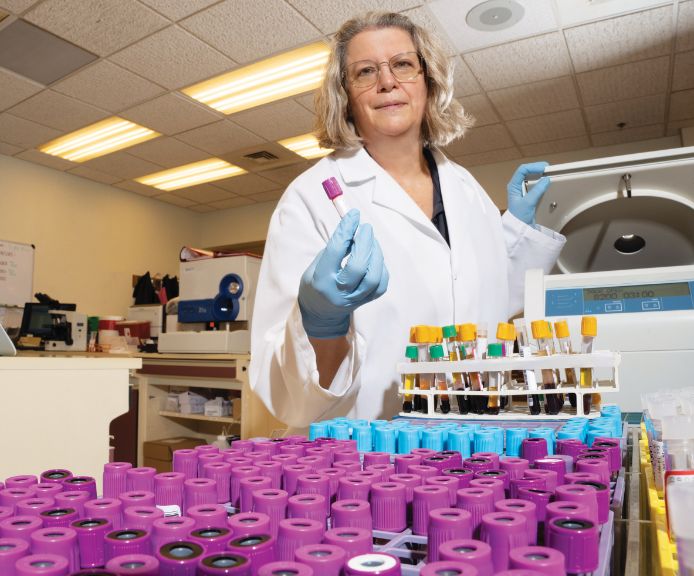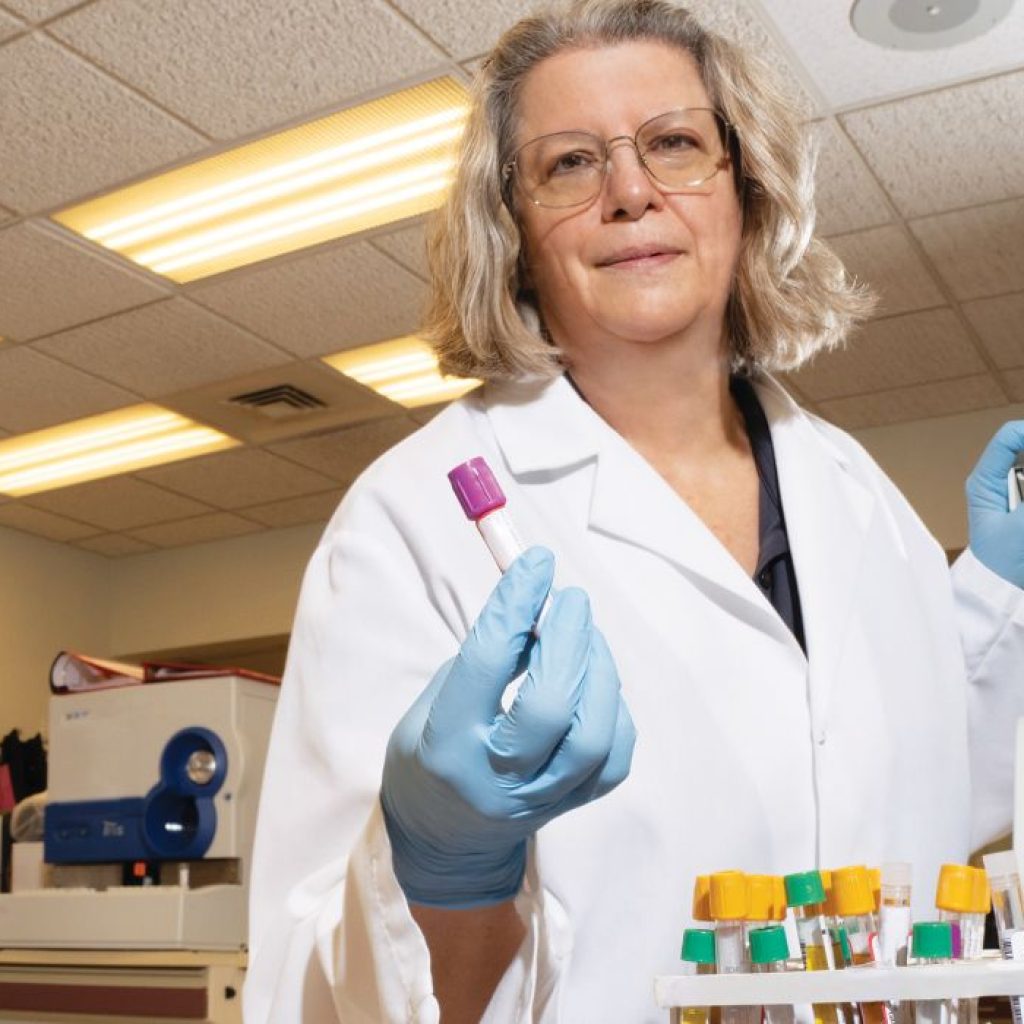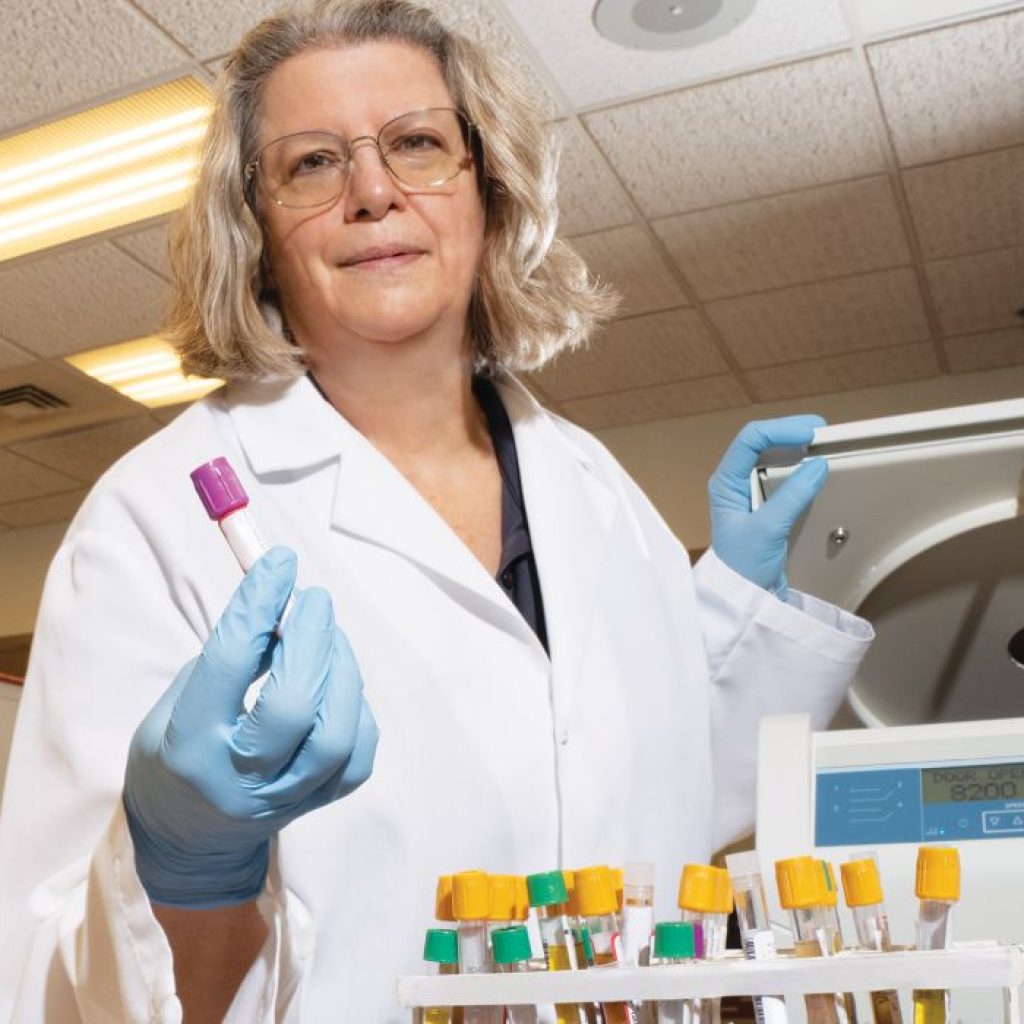LEADING LABORATORY QUALITY
LEADING LABORATORY QUALITY
LEADING LABORATORY QUALITY
Expanding laboratory excellence through member expertise, timely guidance, and trusted resources
Expanding laboratory excellence through member expertise, timely guidance, and trusted resources
Expanding laboratory excellence through member expertise, timely guidance, and trusted resources
CAP Partners with Laboratories to Ensure Quality Patient Care
Built on a foundation of pathologist expertise, the CAP partners with laboratories worldwide to elevate the quality of laboratory medicine with best-in-class solutions designed to drive operational excellence, achieve diagnostic confidence, and ensure the best patient care. The expertise of thousands of pathologist members allows the CAP to stay current with, and rapidly respond to, changes in laboratory medicine and pathology on a global scale.
Laboratories in more than 115 countries rely on the CAP’s Laboratory Quality Solutions, which support laboratories in reaching the highest standards in four key areas via:
- Laboratory accreditation programs to improve quality and reduce risk
- Proficiency testing (PT) to ensure accurate results across all disciplines
- Protocols and guidelines to improve cancer reporting and clinical decision making
- Quality improvement tools to improve processes and strengthen staff expertise
Internationally, the CAP continues to expand its outreach to laboratories in support of our mission to improve the quality of laboratory medicine. To that end, in 2022, over 7,000 participants joined the CAP during web and in-person educational events covering quality measures and more.
Also in 2022, the CAP’s Council on Scientific Affairs (CSA) and Council on Accreditation (CoA), along with numerous committees reporting to each, continued to fuel the excellence of PT and accreditation programs. In addition, the CSA and CoA monitored emerging public health issues impacting pathologists and laboratories. Remaining vigilant allowed members to assemble experts and develop timely guidance to pathologists and laboratory staff on a wide variety of issues, including regulatory updates related to COVID-19, mpox, and other public health emergencies.

CAP Partners with Laboratories to Ensure Quality Patient Care
Built on a foundation of pathologist expertise, the CAP partners with laboratories worldwide to elevate the quality of laboratory medicine with best-in-class solutions designed to drive operational excellence, achieve diagnostic confidence, and ensure the best patient care. The expertise of thousands of pathologist members allows the CAP to stay current with, and rapidly respond to, changes in laboratory medicine and pathology on a global scale.
Laboratories in more than 115 countries rely on the CAP’s Laboratory Quality Solutions, which support laboratories in reaching the highest standards in four key areas via:
- Laboratory accreditation programs to improve quality and reduce risk
- Proficiency testing (PT) to ensure accurate results across all disciplines
- Protocols and guidelines to improve cancer reporting and clinical decision making
- Quality improvement tools to improve processes and strengthen staff expertise
Internationally, the CAP continues to expand its outreach to laboratories in support of our mission to improve the quality of laboratory medicine. To that end, in 2022, over 7,000 participants joined the CAP during web and in-person educational events covering quality measures and more.

Also in 2022, the CAP’s Council on Scientific Affairs (CSA) and Council on Accreditation (CoA), along with numerous committees reporting to each, continued to fuel the excellence of PT and accreditation programs. In addition, the CSA and CoA monitored emerging public health issues impacting pathologists and laboratories. Remaining vigilant allowed members to assemble experts and develop timely guidance to pathologists and laboratory staff on a wide variety of issues, including regulatory updates related to COVID-19, mpox, and other public health emergencies.
CAP Partners with Laboratories to Ensure Quality Patient Care
Built on a foundation of pathologist expertise, the CAP partners with laboratories worldwide to elevate the quality of laboratory medicine with best-in-class solutions designed to drive operational excellence, achieve diagnostic confidence, and ensure the best patient care.
The expertise of thousands of pathologist members allows the CAP to stay current with, and rapidly respond to, changes in laboratory medicine and pathology on a global scale.

Laboratories in more than 115 countries rely on the CAP’s Laboratory Quality Solutions, which support laboratories in reaching the highest standards in four key areas via:
- Laboratory accreditation programs to improve quality and reduce risk
- Proficiency testing (PT) to ensure accurate results across all disciplines
- Protocols and guidelines to improve cancer reporting and clinical decision making
- Quality improvement tools to improve processes and strengthen staff expertise
Internationally, the CAP continues to expand its outreach to laboratories in support of our mission to improve the quality of laboratory medicine. To that end, in 2022, over 7,000 participants joined the CAP during web and in-person educational events covering quality measures and more.
Also in 2022, the CAP’s Council on Scientific Affairs (CSA) and Council on Accreditation (CoA), along with numerous committees reporting to each, continued to fuel the excellence of PT and accreditation programs. In addition, the CSA and CoA monitored emerging public health issues impacting pathologists and laboratories. Remaining vigilant allowed members to assemble experts and develop timely guidance to pathologists and laboratory staff on a wide variety of issues, including regulatory updates related to COVID-19, mpox, and other public health emergencies.
CAP Accreditation Expands Quality Globally
The CAP accredits more than 8,000 laboratories spread across 58 countries, with more than 650 laboratories outside the US. These laboratories rely on the CAP’s core Laboratory Accreditation Program, as well as specialty programs for biorepository, reproductive, and forensic drug testing, to achieve higher standards of quality.
Complementing the Laboratory Accreditation Program, the CAP 15189 program covers the ISO 15189 international quality standard for medical laboratories. It includes the ISO 15189’s process orientation and management of systems, helping laboratories probe deeper into systemic issues, root cause, risk management, and ways to improve operational agility and efficiency. Over the past two years, the CAP 15189 program has grown by 26% in US and overseas markets.
The new version of the CAP 15189 program was released in December 2022 and emphasizes risk management to align with updated ISO recommendations. In 2022, the CAP developed resources to support customers’ transition to these forthcoming risk-based standards through education on risk management, risk heat map tools, and a focus on compliance webinar.
CAP Accreditation Expands Quality Globally
The CAP accredits more than 8,000 laboratories spread across 58 countries, with more than 650 laboratories outside the US. These laboratories rely on the CAP’s core Laboratory Accreditation Program, as well as specialty programs for biorepository, reproductive, and forensic drug testing, to achieve higher standards of quality.
Complementing the Laboratory Accreditation Program, the CAP 15189 program covers the ISO 15189 international quality standard for medical laboratories. It includes the ISO 15189’s process orientation and management of systems, helping laboratories probe deeper into systemic issues, root cause, risk management, and ways to improve operational agility and efficiency. Over the past two years, the CAP 15189 program has grown by 26% in US and overseas markets.
The new version of the CAP 15189 program was released in December 2022 and emphasizes risk management to align with updated ISO recommendations. In 2022, the CAP developed resources to support customers’ transition to these forthcoming risk-based standards through education on risk management, risk heat map tools, and a focus on compliance webinar.
CAP Accreditation Expands Quality Globally
The CAP accredits more than 8,000 laboratories spread across 58 countries, with more than 650 laboratories outside the US. These laboratories rely on the CAP’s core Laboratory Accreditation Program, as well as specialty programs for biorepository, reproductive, and forensic drug testing, to achieve higher standards of quality.
Complementing the Laboratory Accreditation Program, the CAP 15189 program covers the ISO 15189 international quality standard for medical laboratories. It includes the ISO 15189’s process orientation and management of systems, helping laboratories probe deeper into systemic issues, root cause, risk management, and ways to improve operational agility and efficiency. Over the past two years, the CAP 15189 program has grown by 26% in US and overseas markets.
The new version of the CAP 15189 program was released in December 2022 and emphasizes risk management to align with updated ISO recommendations. In 2022, the CAP developed resources to support customers’ transition to these forthcoming risk-based standards through education on risk management, risk heat map tools, and a focus on compliance webinar.
New PT Programs Meet Laboratory Needs
More than 23,000 laboratories across the world count on CAP PT for providing high-quality and accurate patient testing. In 2022, the CAP launched 15 new PT programs that covered eight disciplines:
- Informatics
- Microbiology
- Quality management
- Hematology
- Chemistry
- Hemostasis
- Molecular genetics
- Immunohistochemistry
As the COVID-19 pandemic remained a top concern, the CAP continued to support laboratories with PT specifically for SARS-CoV-2.
As more patients benefit from precision medicine, the CAP’s PT program continued to develop personalized medicine products to meet laboratories’ needs. The CAP maintained its ongoing assessment of PT requirements related to predictive biomarkers, given the significant implications staining procedures and interpretation of predictive markers have on patient treatment. While CAP accreditation has required PT for breast predictive marker testing by immunohistochemistry for several years, other markers deserve the same level of scrutiny due to the difficulty of these tests and the impact on patient care. In 2022, requirements were finalized to expand these PT requirements. CSA and CoA members collaborated on identifying other critical predictive markers that require PT participation and monitoring.
2022 Checklist Edition Enhancements Simplify Process
The 2022 edition of the Laboratory Accreditation Program checklists introduced enhancements to clarify and simplify the inspection process for both laboratories and inspectors. With the annual release of the 21 discipline-specific checklists, the CAP continued to serve its laboratory partners and their patients with rigorous requirements confirming regulatory compliance while applying modern best practices in laboratory medicine.
Key enhancements featured in the 2022 checklist edition include:
- A new policy/procedure icon to signal that a laboratory must have a written policy or procedure document to fulfill the checklist requirement. The icon also alerts inspectors to check for supporting documentation.
- Inclusion of previously cited deficiencies within the related checklist requirements, which is designed for the inspector’s version of the checklists to improve efficiency.
- Enhanced notes section within the customized Molecular Pathology Checklist aimed at benefitting laboratories performing next-generation sequencing, as well as further requirement customization of the Laboratory General Checklist for waived-only laboratories.
- Modifications to the Laboratory General checklist for waived-only laboratories to right-size the content in a customized checklist for laboratories performing only waived testing.
CAP inspection teams, made up of pathologists and experienced laboratory professionals, use the checklists as a tool to monitor laboratory compliance. CAP checklists incorporate required standards from Clinical Laboratory Improvement Amendments (CLIA), the US Food and Drug Administration (FDA), and the Occupational Safety and Health Administration, strengthening each laboratory’s ability to deliver high-quality service for the best patient care possible. The CAP updates its checklist requirements annually based on input and best practices from experts on the CAP’s 28 scientific committees. The Centers for Medicare and Medicaid Services (CMS) has approved the CAP as an accreditation organization with deeming authority to inspect laboratories under CLIA.

New PT Programs Meet Laboratory Needs
More than 23,000 laboratories across the world count on CAP PT for providing high-quality and accurate patient testing. In 2022, the CAP launched 15 new PT programs that covered eight disciplines:
- Informatics
- Microbiology
- Quality management
- Hematology
- Chemistry
- Hemostasis
- Molecular genetics
- Immunohistochemistry
As the COVID-19 pandemic remained a top concern, the CAP continued to support laboratories with PT specifically for SARS-CoV-2.
As more patients benefit from precision medicine, the CAP’s PT program continued to develop personalized medicine products to meet laboratories’ needs. The CAP maintained its ongoing assessment of PT requirements related to predictive biomarkers, given the significant implications staining procedures and interpretation of predictive markers have on patient treatment. While CAP accreditation has required PT for breast predictive marker testing by immunohistochemistry for several years, other markers deserve the same level of scrutiny due to the difficulty of these tests and the impact on patient care. In 2022, requirements were finalized to expand these PT requirements. CSA and CoA members collaborated on identifying other critical predictive markers that require PT participation and monitoring.
2022 Checklist Edition Enhancements Simplify Process
The 2022 edition of the Laboratory Accreditation Program checklists introduced enhancements to clarify and simplify the inspection process for both laboratories and inspectors. With the annual release of the 21 discipline-specific checklists, the CAP continued to serve its laboratory partners and their patients with rigorous requirements confirming regulatory compliance while applying modern best practices in laboratory medicine.
Key enhancements featured in the 2022 checklist edition include:
- A new policy/procedure icon to signal that a laboratory must have a written policy or procedure document to fulfill the checklist requirement. The icon also alerts inspectors to check for supporting documentation.
- Inclusion of previously cited deficiencies within the related checklist requirements, which is designed for the inspector’s version of the checklists to improve efficiency.
- Enhanced notes section within the customized Molecular Pathology Checklist aimed at benefitting laboratories performing next-generation sequencing, as well as further requirement customization of the Laboratory General Checklist for waived-only laboratories.
- Modifications to the Laboratory General checklist for waived-only laboratories to right-size the content in a customized checklist for laboratories performing only waived testing.
CAP inspection teams, made up of pathologists and experienced laboratory professionals, use the checklists as a tool to monitor laboratory compliance. CAP checklists incorporate required standards from Clinical Laboratory Improvement Amendments (CLIA), the US Food and Drug Administration (FDA), and the Occupational Safety and Health Administration, strengthening each laboratory’s ability to deliver high-quality service for the best patient care possible. The CAP updates its checklist requirements annually based on input and best practices from experts on the CAP’s 28 scientific committees. The Centers for Medicare and Medicaid Services (CMS) has approved the CAP as an accreditation organization with deeming authority to inspect laboratories under CLIA.

New PT Programs Meet Laboratory Needs
More than 23,000 laboratories across the world count on CAP PT for providing high-quality and accurate patient testing. In 2022, the CAP launched 15 new PT programs that covered eight disciplines:
- Informatics
- Microbiology
- Quality management
- Hematology
- Chemistry
- Hemostasis
- Molecular genetics
- Immunohistochemistry
As the COVID-19 pandemic remained a top concern, the CAP continued to support laboratories with PT specifically for SARS-CoV-2.
As more patients benefit from precision medicine, the CAP’s PT program continued to develop personalized medicine products to meet laboratories’ needs. The CAP maintained its ongoing assessment of PT requirements related to predictive biomarkers, given the significant implications staining procedures and interpretation of predictive markers have on patient treatment. While CAP accreditation has required PT for breast predictive marker testing by immunohistochemistry for several years, other markers deserve the same level of scrutiny due to the difficulty of these tests and the impact on patient care. In 2022, requirements were finalized to expand these PT requirements. CSA and CoA members collaborated on identifying other critical predictive markers that require PT participation and monitoring.
2022 Checklist Edition Enhancements Simplify Process
The 2022 edition of the Laboratory Accreditation Program checklists introduced enhancements to clarify and simplify the inspection process for both laboratories and inspectors.
With the annual release of the 21 discipline-specific checklists, the CAP continued to serve its laboratory partners and their patients with rigorous requirements confirming regulatory compliance while applying modern best practices in laboratory medicine.
Key enhancements featured in the 2022 checklist edition include:
- A new policy/procedure icon to signal that a laboratory must have a written policy or procedure document to fulfill the checklist requirement. The icon also alerts inspectors to check for supporting documentation.
- Inclusion of previously cited deficiencies within the related checklist requirements, which is designed for the inspector’s version of the checklists to improve efficiency.
- Enhanced notes section within the customized Molecular Pathology Checklist aimed at benefitting laboratories performing next-generation sequencing, as well as further requirement customization of the Laboratory General Checklist for waived-only laboratories.
- Modifications to the Laboratory General checklist for waived-only laboratories to right-size the content in a customized checklist for laboratories performing only waived testing.
CAP inspection teams, made up of pathologists and experienced laboratory professionals, use the checklists as a tool to monitor laboratory compliance. CAP checklists incorporate required standards from Clinical Laboratory Improvement Amendments (CLIA), the US Food and Drug Administration (FDA), and the Occupational Safety and Health Administration, strengthening each laboratory’s ability to deliver high-quality service for the best patient care possible. The CAP updates its checklist requirements annually based on input and best practices from experts on the CAP’s 28 scientific committees. The Centers for Medicare and Medicaid Services (CMS) has approved the CAP as an accreditation organization with deeming authority to inspect laboratories under CLIA.

Two New Evidence-Based Guidelines Improve Diagnoses
With two new guidelines released in 2022, the CAP’s Pathology and Laboratory Quality Center for Evidence-Based Guidelines (the Center) led the development of high-quality clinical practice guidelines for pathologists and laboratories.
The Center—in collaboration with the Society for Neuro-Oncology, the American Association of Neuropathologists, and the Association for Molecular Pathology (AMP)—released “Molecular Biomarker Testing for the Diagnosis of Diffuse Gliomas” to improve how pediatric and adult patients with these most common types of primary brain tumors are diagnosed and their cases managed. Traditionally, diffuse gliomas have been classified by their microscopic properties as astrocytomas, oligodendrogliomas, or oligoastrocytomas, ranging from World Health Organization grades 2 to 4. With the new CAP guideline, clinical teams now have evidence-based guidance for diffuse glioma molecular testing more broadly, which can help improve diagnosis, prognosis, and therapeutic care for patients.
In addition to the diffuse gliomas guideline, the Center, in collaboration with the AMP, the American Society of Clinical Oncology, and the patient advocacy group Fight Colorectal Cancer, released a guideline that is among the first to address testing based less on the cancer type or tumor origin and more on the methodology and status of a biomarker—in this case, microsatellite testing and deficient mismatch repair process assessment.
The “Mismatch Repair (MMR) and Microsatellite Instability (MSI) Testing for Immune Checkpoint Inhibitor Therapy” guideline provides clarity for pathologists and oncologists to improve the evaluation of patients with colorectal, endometrial, gastroesophageal, small bowel, and certain other cancers who may be eligible for immunotherapies known as immune checkpoint inhibitors. The guideline also breaks new ground with recommendations on the role of tumor mutational burden in MMR testing and the evaluation for Lynch syndrome.
The Center is committed to developing new guidelines that help pathologists and other medical professionals make informed decisions while also emphasizing the pathologists’ role in patient care.
Two New Evidence-Based Guidelines Improve Diagnoses
With two new guidelines released in 2022, the CAP’s Pathology and Laboratory Quality Center for Evidence-Based Guidelines (the Center) led the development of high-quality clinical practice guidelines for pathologists and laboratories.
The Center—in collaboration with the Society for Neuro-Oncology, the American Association of Neuropathologists, and the Association for Molecular Pathology (AMP)—released “Molecular Biomarker Testing for the Diagnosis of Diffuse Gliomas” to improve how pediatric and adult patients with these most common types of primary brain tumors are diagnosed and their cases managed. Traditionally, diffuse gliomas have been classified by their microscopic properties as astrocytomas, oligodendrogliomas, or oligoastrocytomas, ranging from World Health Organization grades 2 to 4. With the new CAP guideline, clinical teams now have evidence-based guidance for diffuse glioma molecular testing more broadly, which can help improve diagnosis, prognosis, and therapeutic care for patients.
In addition to the diffuse gliomas guideline, the Center, in collaboration with the AMP, the American Society of Clinical Oncology, and the patient advocacy group Fight Colorectal Cancer, released a guideline that is among the first to address testing based less on the cancer type or tumor origin and more on the methodology and status of a biomarker—in this case, microsatellite testing and deficient mismatch repair process assessment.
The “Mismatch Repair (MMR) and Microsatellite Instability (MSI) Testing for Immune Checkpoint Inhibitor Therapy” guideline provides clarity for pathologists and oncologists to improve the evaluation of patients with colorectal, endometrial, gastroesophageal, small bowel, and certain other cancers who may be eligible for immunotherapies known as immune checkpoint inhibitors. The guideline also breaks new ground with recommendations on the role of tumor mutational burden in MMR testing and the evaluation for Lynch syndrome.
The Center is committed to developing new guidelines that help pathologists and other medical professionals make informed decisions while also emphasizing the pathologists’ role in patient care.
Two New Evidence-Based Guidelines Improve Diagnoses
With two new guidelines released in 2022, the CAP’s Pathology and Laboratory Quality Center for Evidence-Based Guidelines (the Center) led the development of high-quality clinical practice guidelines for pathologists and laboratories.
The Center—in collaboration with the Society for Neuro-Oncology, the American Association of Neuropathologists, and the Association for Molecular Pathology (AMP)—released “Molecular Biomarker Testing for the Diagnosis of Diffuse Gliomas” to improve how pediatric and adult patients with these most common types of primary brain tumors are diagnosed and their cases managed. Traditionally, diffuse gliomas have been classified by their microscopic properties as astrocytomas, oligodendrogliomas, or oligoastrocytomas, ranging from World Health Organization grades 2 to 4. With the new CAP guideline, clinical teams now have evidence-based guidance for diffuse glioma molecular testing more broadly, which can help improve diagnosis, prognosis, and therapeutic care for patients.
In addition to the diffuse gliomas guideline, the Center, in collaboration with the AMP, the American Society of Clinical Oncology, and the patient advocacy group Fight Colorectal Cancer, released a guideline that is among the first to address testing based less on the cancer type or tumor origin and more on the methodology and status of a biomarker—in this case, microsatellite testing and deficient mismatch repair process assessment.
The “Mismatch Repair (MMR) and Microsatellite Instability (MSI) Testing for Immune Checkpoint Inhibitor Therapy” guideline provides clarity for pathologists and oncologists to improve the evaluation of patients with colorectal, endometrial, gastroesophageal, small bowel, and certain other cancers who may be eligible for immunotherapies known as immune checkpoint inhibitors. The guideline also breaks new ground with recommendations on the role of tumor mutational burden in MMR testing and the evaluation for Lynch syndrome.
The Center is committed to developing new guidelines that help pathologists and other medical professionals make informed decisions while also emphasizing the pathologists’ role in patient care.
New Council Focuses on Informatics and Pathology Innovation
In early October, the CAP launched its first new council in 18 years, the Council on Informatics and Pathology Innovation (CIPI). CIPI strengthens the organization’s commitment to strategy and direction guidance on current and emerging medical information science, utility of clinical content and health information technical standards, data science, and computational technologies that could impact the practice of pathology. CIPI is also charged with providing informatics domain information and expertise to the CAP in furtherance of its programs and mission while supporting appropriate engagement with external stakeholders.
Approved in March 2022 by the Board of Governors, CIPI comprises the following committees: Artificial Intelligence (AI), Cancer, Digital and Computational Pathology (DCPC), Informatics, and Pathology Electronic Reporting (PERT). These committees continue to focus on interoperability and pathology reports. In September, the CAP began work on a laboratory coding quality assurance design as part of a $1 million contract with the FDA.
Other highlights from these committees included developing educational opportunities related to technology, among other achievements:
- AI Committee – conducted an initial gap analysis of members to determine the level of interest, implementation, and knowledge of AI, which will be used to create education programs.
- Informatics Committee – launched Informatics Essentials for Pathologists, a cased-based continuing education program. The committee collaborated with CAP Advocacy to provide feedback on several government requests for comments, including recommendations for adding necessary laboratory data elements into the US Core Data for Interoperability (USCDI). This committee continues to provide leadership to the SHIELD initiative (Systemic Harmonization and Interoperability Enhancement for Laboratory Data), a public-private organization with over 70 health care organizations, industry partners, and government agencies. SHIELD’s goal is to develop and launch collaborative policies and business models to overcome laboratory interoperability barriers.
- Digital and Computational Pathology Committee – continued to contribute to the expanded growth of the Histology Quality Improvement Program for Whole Slide Images. The DCPC also created six workgroups with the overarching charge to aid in the adoption and implementation of digital pathology, in vivo microscopy, and ex vivo microscopy technologies.


The newly founded Council on Informatics and Pathology Innovation, from top left: Eric F. Glassy, MD, FCAP; George G. Birdsong, MD, FCAP; Patrick L. Fitzgibbons, MD, FCAP (guest); Jansen Seheult, MD, MBBCh, MS, MSc, FCAP; William H. Yong, MD (liaison), FCAP; Michelle Stram, MD, FCAP; Robert S. Freund, MD, FCAP (member-J); John H. Sinard, MD, FCAP (advisor); Diana M. Cardona, MD, FCAP; Matthew Luo, MD (member-J); Narciso Albarracin Jr, MS (advisor). From bottom left: Jochen K. Lennerz, MD, PhD, FCAP; Andrew J. Evans, MD, FCAP; Savitri Krishnamurthy, MD, FCAP; Raj C. Dash, MD, FCAP; Marilyn M. Bui, MD, PhD, FCAP; Mary E. Edgerton, MD, PhD, FCAP; James H. Harrison, MD, PhD, FCAP; M.E. (Doc) de Baca, MD, FCAP (chair); Bobbi S. Pritt, MD, MS, FCAP; Guillermo G. Martinez-Torres, MD, FCAP; Neils H. Olson, MD, FCAP; William D. Wallace, MD, FCAP. Members not pictured: Joseph D. Khoury, MD, FCAP; Walter H. Henricks, MD, FCAP.
New Council Focuses on Informatics and Pathology Innovation
In early October, the CAP launched its first new council in 18 years, the Council on Informatics and Pathology Innovation (CIPI). CIPI strengthens the organization’s commitment to strategy and direction guidance on current and emerging medical information science, utility of clinical content and health information technical standards, data science, and computational technologies that could impact the practice of pathology. CIPI is also charged with providing informatics domain information and expertise to the CAP in furtherance of its programs and mission while supporting appropriate engagement with external stakeholders.

Approved in March 2022 by the Board of Governors, CIPI comprises the following committees: Artificial Intelligence (AI), Cancer, Digital and Computational Pathology (DCPC), Informatics, and Pathology Electronic Reporting (PERT). These committees continue to focus on interoperability and pathology reports. In September, the CAP began work on a laboratory coding quality assurance design as part of a $1 million contract with the FDA.
Other highlights from these committees included developing educational opportunities related to technology, among other achievements:
- AI Committee – conducted an initial gap analysis of members to determine the level of interest, implementation, and knowledge of AI, which will be used to create education programs.
- Informatics Committee – launched Informatics Essentials for Pathologists, a cased-based continuing education program. The committee collaborated with CAP Advocacy to provide feedback on several government requests for comments, including recommendations for adding necessary laboratory data elements into the US Core Data for Interoperability (USCDI). This committee continues to provide leadership to the SHIELD initiative (Systemic Harmonization and Interoperability Enhancement for Laboratory Data), a public-private organization with over 70 health care organizations, industry partners, and government agencies. SHIELD’s goal is to develop and launch collaborative policies and business models to overcome laboratory interoperability barriers.
- Digital and Computational Pathology Committee – continued to contribute to the expanded growth of the Histology Quality Improvement Program for Whole Slide Images. The DCPC also created six workgroups with the overarching charge to aid in the adoption and implementation of digital pathology, in vivo microscopy, and ex vivo microscopy technologies.

The newly founded Council on Informatics and Pathology Innovation, from top left: Eric F. Glassy, MD, FCAP; George G. Birdsong, MD, FCAP; Patrick L. Fitzgibbons, MD, FCAP (guest); Jansen Seheult, MD, MBBCh, MS, MSc, FCAP; William H. Yong, MD (liaison), FCAP; Michelle Stram, MD, FCAP; Robert S. Freund, MD, FCAP (member-J); John H. Sinard, MD, FCAP (advisor); Diana M. Cardona, MD, FCAP; Matthew Luo, MD (member-J); Narciso Albarracin Jr, MS (advisor). From bottom left: Jochen K. Lennerz, MD, PhD, FCAP; Andrew J. Evans, MD, FCAP; Savitri Krishnamurthy, MD, FCAP; Raj C. Dash, MD, FCAP; Marilyn M. Bui, MD, PhD, FCAP; Mary E. Edgerton, MD, PhD, FCAP; James H. Harrison, MD, PhD, FCAP; M.E. (Doc) de Baca, MD, FCAP (chair); Bobbi S. Pritt, MD, MS, FCAP; Guillermo G. Martinez-Torres, MD, FCAP; Neils H. Olson, MD, FCAP; William D. Wallace, MD, FCAP. Members not pictured: Joseph D. Khoury, MD, FCAP; Walter H. Henricks, MD, FCAP.
New Council Focuses on Informatics and Pathology Innovation
In early October, the CAP launched its first new council in 18 years, the Council on Informatics and Pathology Innovation (CIPI).
CIPI strengthens the organization’s commitment to strategy and direction guidance on current and emerging medical information science, utility of clinical content and health information technical standards, data science, and computational technologies that could impact the practice of pathology. CIPI is also charged with providing informatics domain information and expertise to the CAP in furtherance of its programs and mission while supporting appropriate engagement with external stakeholders.

Approved in March 2022 by the Board of Governors, CIPI comprises the following committees: Artificial Intelligence (AI), Cancer, Digital and Computational Pathology (DCPC), Informatics, and Pathology Electronic Reporting (PERT). These committees continue to focus on interoperability and pathology reports. In September, the CAP began work on a laboratory coding quality assurance design as part of a $1 million contract with the FDA.
Other highlights from these committees included developing educational opportunities related to technology, among other achievements:
- AI Committee – conducted an initial gap analysis of members to determine the level of interest, implementation, and knowledge of AI, which will be used to create education programs.
- Informatics Committee – launched Informatics Essentials for Pathologists, a cased-based continuing education program. The committee collaborated with CAP Advocacy to provide feedback on several government requests for comments, including recommendations for adding necessary laboratory data elements into the US Core Data for Interoperability (USCDI). This committee continues to provide leadership to the SHIELD initiative (Systemic Harmonization and Interoperability Enhancement for Laboratory Data), a public-private organization with over 70 health care organizations, industry partners, and government agencies. SHIELD’s goal is to develop and launch collaborative policies and business models to overcome laboratory interoperability barriers.
- Digital and Computational Pathology Committee – continued to contribute to the expanded growth of the Histology Quality Improvement Program for Whole Slide Images. The DCPC also created six workgroups with the overarching charge to aid in the adoption and implementation of digital pathology, in vivo microscopy, and ex vivo microscopy technologies.

The newly founded Council on Informatics and Pathology Innovation, from top left: Eric F. Glassy, MD, FCAP; George G. Birdsong, MD, FCAP; Patrick L. Fitzgibbons, MD, FCAP (guest); Jansen Seheult, MD, MBBCh, MS, MSc, FCAP; William H. Yong, MD (liaison), FCAP; Michelle Stram, MD, FCAP; Robert S. Freund, MD, FCAP (member-J); John H. Sinard, MD, FCAP (advisor); Diana M. Cardona, MD, FCAP; Matthew Luo, MD (member-J); Narciso Albarracin Jr, MS (advisor). From bottom left: Jochen K. Lennerz, MD, PhD, FCAP; Andrew J. Evans, MD, FCAP; Savitri Krishnamurthy, MD, FCAP; Raj C. Dash, MD, FCAP; Marilyn M. Bui, MD, PhD, FCAP; Mary E. Edgerton, MD, PhD, FCAP; James H. Harrison, MD, PhD, FCAP; M.E. (Doc) de Baca, MD, FCAP (chair); Bobbi S. Pritt, MD, MS, FCAP; Guillermo G. Martinez-Torres, MD, FCAP; Neils H. Olson, MD, FCAP; William D. Wallace, MD, FCAP. Members not pictured: Joseph D. Khoury, MD, FCAP; Walter H. Henricks, MD, FCAP.
Four New Cancer Protocols Ensure Reporting Rigor
In addition to the CIPI focus on informatics and innovation, the council’s Cancer and PERT committees collaborated to develop CAP cancer reporting protocols, which provide guidelines for collecting the essential data elements for complete reporting of malignant tumors and optimal patient care.
In 2022, the CAP released four new and 52 revised cancer protocols. The four new protocols were:
- Protocol for the Examination of Resection Specimens from Patients with Phyllodes Tumor of the Breast
- Protocol for the Examination of Specimens from Patients with Cutaneous Squamous Cell Carcinoma of the Head and Neck
- Protocol for the Examination of Tumors of the Brain and Spinal Cord (combines Integrated Diagnosis and Histological Assessment)
- Template for Reporting Results of Biomarker Testing of Specimens from Patients with Carcinoma of Gynecologic Origin
Additional release highlights included pediatric protocol updates and WHO Bluebook updates, which featured central nervous system tumors, pediatric tumors, and endocrine and neuroendocrine tumors.
The CAP’s quality improvement team continued to assess challenges and implement new strategies related to how customers employ cancer protocols. The team focused on improving the customer experience by expanding written procedures, enhancing the single source product tool used to construct the cancer protocols, and advancing database queries used to identify potential systemic errors and verify the accuracy of data elements. In addition, the team developed new training guides, competency testing, and a quarterly release schedule to balance staff workload and reduce the potential for error. These efforts yielded several positive outcomes: fewer nonconformances, fewer customer-reported issues, a more balanced workload, and the reduction or elimination of unplanned protocol releases.
In addition to these improvements, the electronic Cancer Checklists (eCC) and the electronic forms and reporting module (eFRM) were renamed CAP electronic cancer protocols (eCP) in late 2022. The simplification into one name underscores the value of using electronic versions of the protocols.
Four New Cancer Protocols Ensure Reporting Rigor
In addition to the CIPI focus on informatics and innovation, the council’s Cancer and PERT committees collaborated to develop CAP cancer reporting protocols, which provide guidelines for collecting the essential data elements for complete reporting of malignant tumors and optimal patient care.
In 2022, the CAP released four new and 52 revised cancer protocols. The four new protocols were:
- Protocol for the Examination of Resection Specimens from Patients with Phyllodes Tumor of the Breast
- Protocol for the Examination of Specimens from Patients with Cutaneous Squamous Cell Carcinoma of the Head and Neck
- Protocol for the Examination of Tumors of the Brain and Spinal Cord (combines Integrated Diagnosis and Histological Assessment)
- Template for Reporting Results of Biomarker Testing of Specimens from Patients with Carcinoma of Gynecologic Origin
Additional release highlights included pediatric protocol updates and WHO Bluebook updates, which featured central nervous system tumors, pediatric tumors, and endocrine and neuroendocrine tumors.
The CAP’s quality improvement team continued to assess challenges and implement new strategies related to how customers employ cancer protocols. The team focused on improving the customer experience by expanding written procedures, enhancing the single source product tool used to construct the cancer protocols, and advancing database queries used to identify potential systemic errors and verify the accuracy of data elements. In addition, the team developed new training guides, competency testing, and a quarterly release schedule to balance staff workload and reduce the potential for error. These efforts yielded several positive outcomes: fewer nonconformances, fewer customer-reported issues, a more balanced workload, and the reduction or elimination of unplanned protocol releases.
In addition to these improvements, the electronic Cancer Checklists (eCC) and the electronic forms and reporting module (eFRM) were renamed CAP electronic cancer protocols (eCP) in late 2022. The simplification into one name underscores the value of using electronic versions of the protocols.
Four New Cancer Protocols Ensure Reporting Rigor
In addition to the CIPI focus on informatics and innovation, the council’s Cancer and PERT committees collaborated to develop CAP cancer reporting protocols, which provide guidelines for collecting the essential data elements for complete reporting of malignant tumors and optimal patient care.
In 2022, the CAP released four new and 52 revised cancer protocols. The four new protocols were:
- Protocol for the Examination of Resection Specimens from Patients with Phyllodes Tumor of the Breast
- Protocol for the Examination of Specimens from Patients with Cutaneous Squamous Cell Carcinoma of the Head and Neck
- Protocol for the Examination of Tumors of the Brain and Spinal Cord (combines Integrated Diagnosis and Histological Assessment)
- Template for Reporting Results of Biomarker Testing of Specimens from Patients with Carcinoma of Gynecologic Origin
Additional release highlights included pediatric protocol updates and WHO Bluebook updates, which featured central nervous system tumors, pediatric tumors, and endocrine and neuroendocrine tumors.
The CAP’s quality improvement team continued to assess challenges and implement new strategies related to how customers employ cancer protocols. The team focused on improving the customer experience by expanding written procedures, enhancing the single source product tool used to construct the cancer protocols, and advancing database queries used to identify potential systemic errors and verify the accuracy of data elements. In addition, the team developed new training guides, competency testing, and a quarterly release schedule to balance staff workload and reduce the potential for error. These efforts yielded several positive outcomes: fewer nonconformances, fewer customer-reported issues, a more balanced workload, and the reduction or elimination of unplanned protocol releases.
In addition to these improvements, the electronic Cancer Checklists (eCC) and the electronic forms and reporting module (eFRM) were renamed CAP electronic cancer protocols (eCP) in late 2022. The simplification into one name underscores the value of using electronic versions of the protocols.
LIVING OUR QUALITY MISSION
23,575
laboratories using
CAP PT
1,889
pathologists participating
in on-site inspections
8,048
CAP-accredited laboratories
LIVING OUR QUALITY MISSION
23,575
Laboratories using the CAP’s PT
1,889
Pathologists participating in on-site inspections
8,048
CAP-accredited laboratories
LIVING OUR
QUALITY MISSION
23,575
Laboratories using the CAP’s PT
1,889
Pathologists participating in on-site inspections
8,048
CAP-accredited laboratories